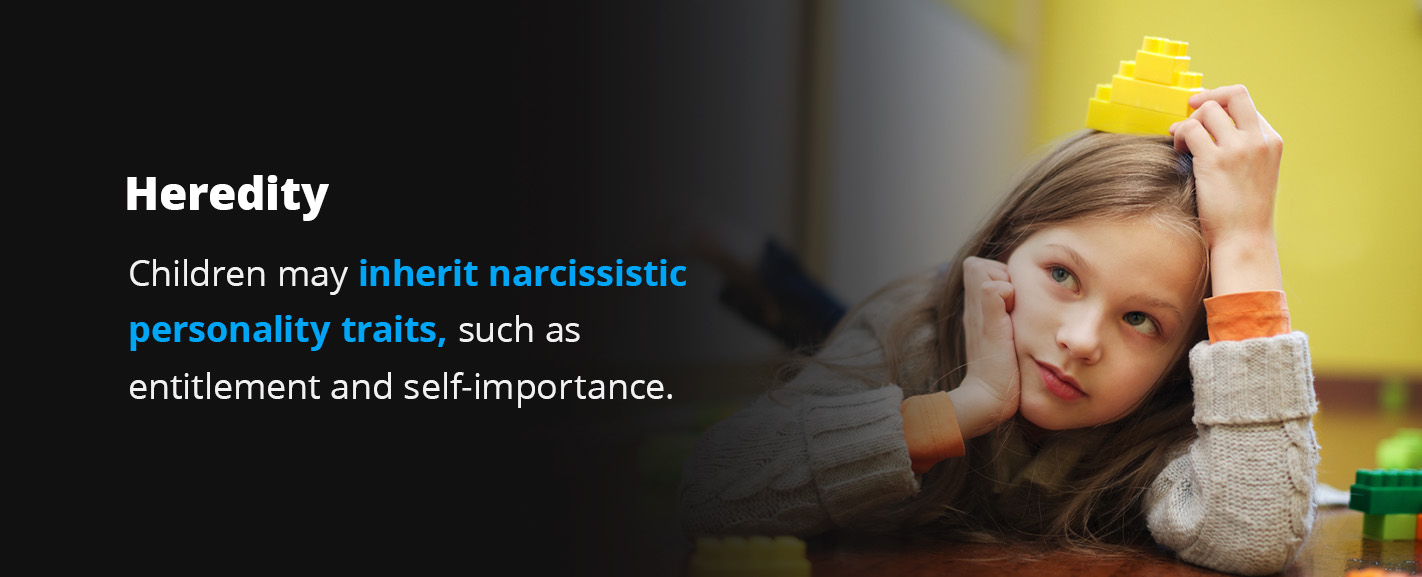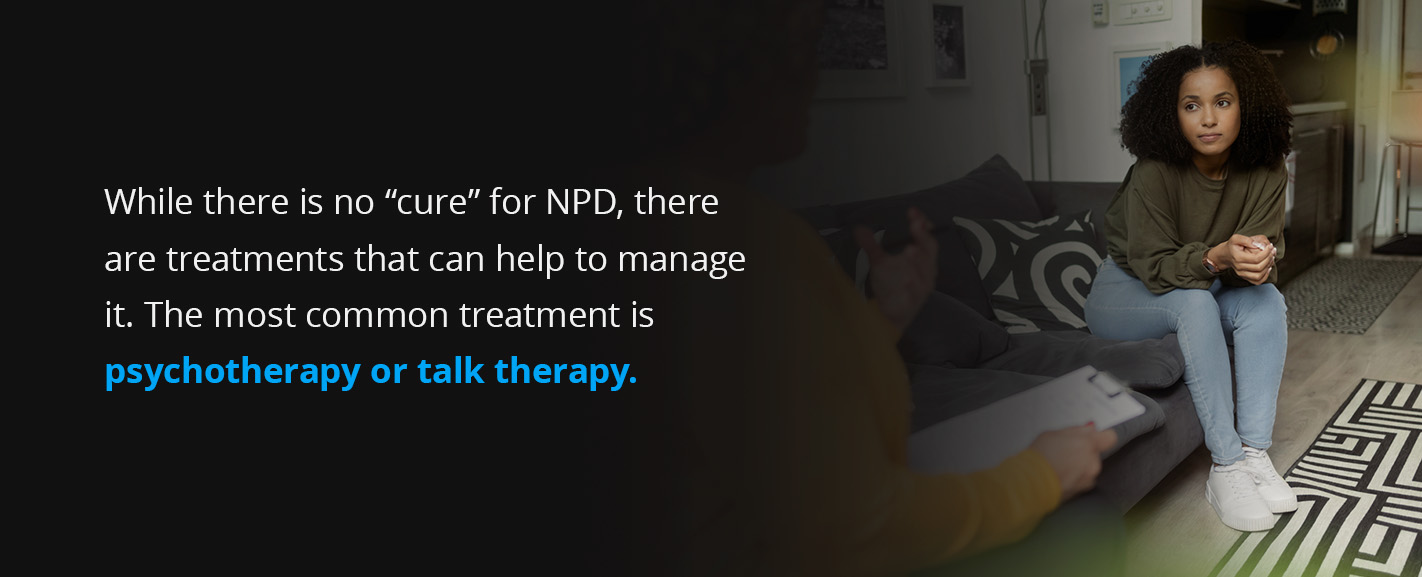The word narcissism is often used to describe someone who is vain or full of themselves. But in psychological terms, narcissism is far more complex. In reality, narcissistic people avoid intense feelings of insecurity through an inflated self-image. Dysfunctional attitudes and behaviors help prop up these delusions of extreme self-importance.
What if you have a close relationship with someone who displays these behaviors? Are they narcissistic? Only a professional can diagnose the condition, but there are signs to identify a narcissist. Learn the symptoms of narcissistic personality disorder and recommendations for what to do in this situation.
What Is Narcissistic Personality Disorder?
Narcissism is a mental condition characterized by a deep need for excessive attention and admiration, an inflated ego and a lack of empathy for others. For people with narcissistic personality disorder (NPD), behind their mask of self-assurance lies a fragile self-esteem damaged by even the slightest criticism.
Narcissism falls under a spectrum, with those on the higher end classified as having NPD, while others fall lower on the spectrum but still display narcissistic traits. There are two main types of narcissism — grandiose and vulnerable. In addition to these categories, there are subtypes with unique traits.
Researchers and experts have established five different types of narcissism:
- Grandiose or overt narcissism: Grandiose or overt narcissists can seem likable and charming. Their over-inflated egos need constant validation. This need for admiration may cause overt narcissists to exaggerate their achievements or deny any unflattering information. They have little empathy for others while believing themselves to be superior.
- Vulnerable or covert narcissism: Vulnerable narcissists shy away from the spotlight. They lack the overinflated self-worth or grandiose narcissists, instead seeing praise to make themselves feel more worthy. These narcissists are often defensive and hypersensitive. Playing the victim is a common behavior for covert narcissists.
- Communal narcissism: The idea of a communal narcissist came to light after a 2018 paper published in the Journal of Research in Personality. These narcissists perceive themselves as charitable and helpful to others. They believe they are “good” people but often act in the opposite way. Communal narcissists desire praise for their altruistic behavior.
- Antagonistic narcissism: While competitiveness is a shared trait in NPD types, it is especially apparent in antagonistic narcissism. This type of narcissist feels they’re in competition with everyone around them. Antagonistic narcissists see arguments and social interactions as something to “win.”
- Malignant narcissism: This form of narcissism has traits of NPD and antisocial personality disorder. Together with common NPD characteristics, malignant narcissists display no remorse for hurting others and may exhibit sadistic behavior. Aggression may be a hallmark of malignant narcissism.
The mental health condition often causes significant issues in many areas of life, including work, relationships, school and even finances. People with narcissism may feel they deserve favors or special attention and then become disappointed and unhappy when they do not receive it from others. They often feel unfulfilled in relationships, while the people in their lives might not enjoy being around them.
While everyone can show occasional narcissistic behavior, genuine narcissists disregard their feelings and the feelings of those around them.
What Causes Narcissistic Personality Disorder?
Research has yet to identify a specific cause for NPD. Instead, it’s thought that multiple factors may contribute. NPD is more likely to develop from:
Heredity
Some studies suggest that genetics may play a part in the development of NPD. Children may inherit narcissistic personality traits, such as entitlement and self-importance. A predisposition to NPD may only surface when triggered by specific risk factors.
Parental Behavior
You may expect the child of narcissistic parents to develop NPD. While this might be true in some cases, it may be the opposite behavior from a parent that leads to narcissism. A study on narcissistic traits in young people showed that overprotection can lead to grandiose tendencies. Overvaluation or exaggerated praise can increase the risk of grandiose narcissism. Leniency may also contribute to vulnerable traits.
While research links parenting behaviors to narcissism, no one style causes NPD.
Culture and Upbringing
Narcissistic tendencies may develop from a child’s childhood environments and experiences. Abuse or maltreatment during childhood may lead to NPD later in life. Research suggests narcissistic traits are higher in individualistic cultures.
Overcriticism from trusted authority figures, like teachers or coaches, may contribute to NPD. Studies suggest that bullying during formative years may also influence narcissistic traits.
Biological Factors
Some research links NPD to biological factors, from molecular imbalances to brain structure. Oxidative stress is an imbalance of antioxidants and free radicals in the body. Studies of people with personality disorders found increased levels of oxidative stress.
A paper published in Personality Neuroscience displayed brain scans of people with NPD. The scans showed reduced gray matter in the empathy pathways of the brain. Other studies suggest changes in the prefrontal brain structure may point to narcissism.
5 Signs of a Narcissist
Even if you understand the diagnostic criteria, it can be tricky to identify the symptoms of NPD in someone, especially if you have a family member with NPD or you’re in a relationship with a narcissist. For this reason, experts will need to administer a Narcissistic Personality Inventory (NPI) to diagnose them with NPD accurately.
Still, knowing the signs of a narcissist might give your relationship some context. Here are a few signs and symptoms of narcissistic personality disorder to watch for:
1. They Were Charming at First
People who display signs of narcissism are often charming and charismatic at first. If you’re in a relationship with one, you might have believed them to be kind and warm initially, only to discover their true personality later down the road. Perhaps your partner complimented you constantly or told you they loved you within the first month. Or maybe they remarked on how smart you are or emphasized your compatibility, even when you first started seeing them.
Narcissists often manufacture superficial connections at the beginning of a relationship to reinforce ideas about themselves. They often see their partners as extensions of themselves but lose interest as the novelty wears off.
2. They Steer Conversations to Talk About Themselves
People with NPD have an overblown sense of self-importance and often exaggerate their achievements. The behavior stems from a desire to be seen as superior. They often talk about their accomplishments with grandiosity to mask their true feelings of insecurity.
They also embellish their skills and talents to gain adoration from others. When they feel important and loved, it inflates their ego more. If you find your partner shrugs off your attempts to talk about yourself, this can signal they’re a narcissist.
3. They Lack Empathy
A lack of empathy, or inability to feel how another person is feeling, is one of the trademark symptoms of narcissistic personality disorder.
Narcissists find it extremely difficult to understand the perspective of others. If you have a family member or partner with NPD, you’ll notice they lack the ability to make you feel validated, understood and accepted. They might not care when you’ve had a hard day at work or school or get bored when you try to express the things that upset you.
4. They’re Manipulative
Another common symptom of narcissism is manipulative or controlling behavior. If you know someone who, at first, tries to please you and then quickly finds a way to put their own needs first, this is a huge red flag. Narcissists often attempt to keep their partner or loved one from their friends or other family members as a means to maintain control over someone they are fixated on. They might even exploit others to gain something for themselves.
Gaslighting is a form of manipulation and emotional abuse characteristic of narcissists. They may lie, falsely accuse others and distort your reality, especially when feeling challenged or abandoned.
5. They Think They’re Right About Everything and Never Apologize
People with NPD are prone to arrogant behavior and attitudes, so standing up to one can feel impossible. There’s no way to debate or compromise with narcissists because they believe they are always right.
A person might be a narcissist if you feel like they:
- Don’t hear you.
- Won’t understand your perspective.
- Don’t take responsibility for their part of an issue.
- Don’t try to compromise.
Narcissists are often bolstered by arguments, which helps them feel in control. And since they believe they’re never wrong, they rarely apologize.
What to Do If You’re Dealing With a Narcissist
If you’ve noticed the above signs in someone you know, you might be dealing with a narcissist. Being in a relationship with a person who criticizes, belittles or manipulates you is emotionally exhausting. The best thing to do in the situation is to create distance between yourself and the person with NPD. Then, you can begin the process of healing.
If you’re unsure how to handle a narcissist, try these tips:
- Remind yourself you deserve better.
- Strengthen your relationships with supportive, empathetic friends.
- Build a support network with friends and family who can help remind you what reality is.
- Avoid arguing with someone with NPD, as it often helps them strengthen control over you.
- Encourage your partner to talk with a therapist.
- See a therapist yourself.
A mental health professional can help you learn how to handle a narcissist, including ways to mitigate the effects of their behavior or establish boundaries with the person. Professionals can also help you recover. People often have trouble assessing what is reality and need help regaining self-esteem after being in a manipulative relationship. In therapy, you can learn the tools to comfort yourself and move forward healthier and happier.
How to Set Boundaries With a Narcissist
When dealing with a narcissist, it’s important to set clear boundaries. These approaches can help:
- Avoid defending or explaining: Resist the urge to justify yourself if a narcissist questions or criticizes you. Reply with something noncombative like, “I stand by my actions.”
- Leave toxic interactions: Empower yourself to walk away from unhealthy situations. You have the right to leave if you feel uncomfortable.
- Define what is and isn’t acceptable: Understand what behavior you will and won’t tolerate. Do you draw the line at name calling or shouting? A narcissist will use tactics to try to break through your boundaries. Stand firm.
- Shift topics: Sidestep inappropriate questions or derogatory comments. Try switching to talking about them or asking them a question. Narcissists enjoy talking about themselves.
- Call them out on bad behavior: Narcissists enjoy pushing boundaries. Make it clear that you recognize their behavior. Say, “I know you’re trying to belittle me,” or “I don’t appreciate your insults.” Stating the obvious robs them of their power.
- Follow through on consequences: Boundaries are ineffective without consequences. What will you do if a narcissist violates your boundaries? Establish what action you plan to take and stick to it.
Can You Cure Narcissism?
While there is no “cure” for NPD, there are treatments that can help to manage it. The most common treatment is psychotherapy or talk therapy. The first step is for the narcissist to accept that they have a problem and to want to seek help. Therapy can help those with NPD understand their feelings and manage them better. It can also have a positive impact on personal relationships. However, it’s important to note there is no quick fix. Therapy can take months or years to see an improvement.
Lifestyle changes can also help. Avoiding substances, like alcohol or drugs, may lessen narcissistic behaviors. Exercise, meditation, or hobbies can help reduce negative feelings that worsen NPD.
Get Professional Support at Merrimack Valley Psychological Associates
Being in a relationship with someone with NPD, platonically or otherwise, can be emotionally taxing. When you need support navigating the challenges, Merrimack Valley Psychological Associates can help.
We provide a wide range of counseling services to help you regain control of your life. Our team can help you cope with anxiety, NPD, or depression in your relationship. We are here to learn about your relationships and empower you to build confidence and improve your life.
Are you curious about our counseling approach? Find the answers you’re looking for on our Frequently Asked Questions page. To schedule an appointment, reach out today.




